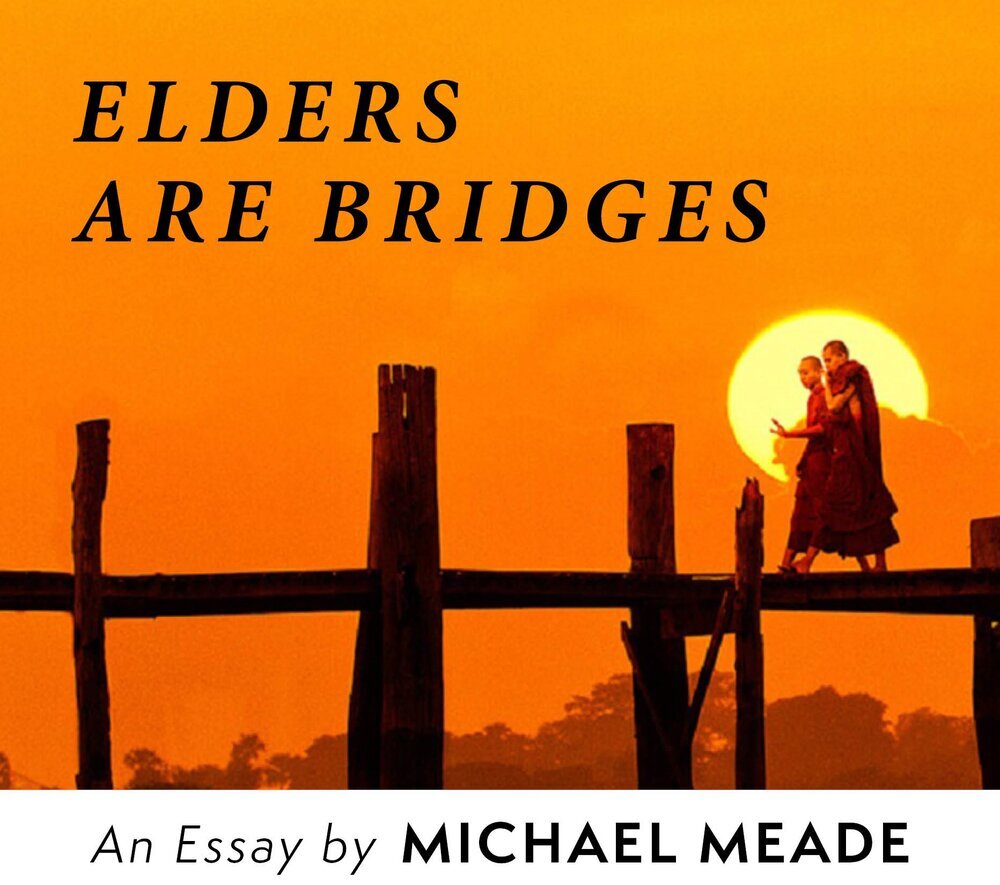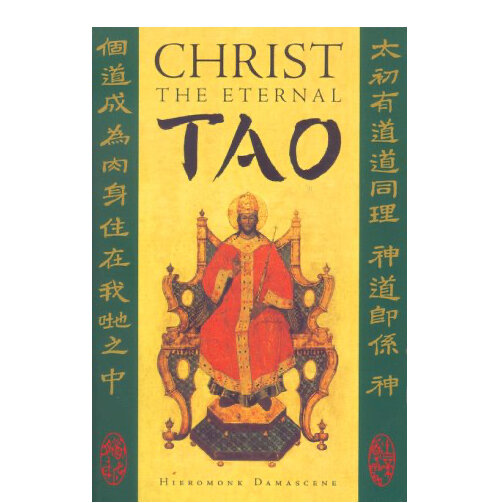
Longing for the Beloved by Mirabai Starr
There is a longing that burns at the root of spiritual practice. This is the fire that fuels your journey. The romantic suffering you pretend to have grown out of, that remains coiled like a serpent beneath the veneer of maturity.

"Aging Is Life’s Way of Helping" by Jeannie Zandi
At a public gathering in my town’s plaza, two women pass me. The elder, who seems about 85 to 90, walks slowly, unsteadily, on sensible shoes. One of her slender, thin-skinned legs, bruised and dotted with age spots, is partially covered in knee-high panty hose, while the other is bare, the stocking fallen and gathered around her ankle. Her sparse white hair, somewhat disheveled, is loosely gathered at the back of her neck. Her frail arm stretches out, with her bony hand firmly grasping the arm of the other woman, who I assume is her daughter. The younger woman takes in the scene around her, while making herself wholly available to the older woman, putting aside any agenda she might have for herself. The mother relies utterly on her daughter’s strength, kindness and slowed pace. A tender closeness between them is palpable in the willingness of the daughter and the dependency of the mother as she clings to her daughter’s arm in much the same way the daughter must have clung to hers when she was too young to walk on her own.
BE A SUPPORTER OF MS. ZANDI’S WORK

“The Nature of Consciousness” - (transcript) by Alan Watts
I find it a little difficult to say what the subject matter of this seminar is going to be, because it's too fundamental to give it a title. I'm going to talk about what there is. Now, the first thing, though, that we have to do is to get our perspectives with some background about the basic ideas that, as Westerners living today in the United States, influence our everyday common sense, our fundamental notions about what life is about. And there are historical origins for this, which influence us more strongly than most people realize. Ideas of the world which are built into the very nature of the language we use, and of our ideas of logic, and of what makes sense altogether.
And these basic ideas I call myth, not using the word 'myth' to mean simply something untrue, but to use the word 'myth' in a more powerful sense. A myth is an image in terms of which we try to make sense of the world. Now, for example, a myth in a way is a metaphor. If you want to explain electricity to someone who doesn't know anything about electricity, you say, well, you talk about an electric current. Now, the word 'current' is borrowed from rivers. It's borrowed from hydraulics, and so you explain electricity in terms of water. Now, electricity is not water, it behaves actually in a different way, but there are some ways in which the behavior of water is like the behavior of electricity, and so you explain it in terms of water. Or if you're an astronomer, and you want to explain to people what you mean by an expanding universe and curved space, you say, 'well, it's as if you have a black balloon, and there are white dots on the black balloon, and those dots represent galaxies, and as you blow the balloon up, uniformly all of them grow farther and farther apart. But you're using an analogy--the universe is not actually a black balloon with white dots on it.
BE A SUPPORTER OF THE ALAN WATTS ORGANIZATION

"Yin: Beloved Dark" by Jeannie Zandi
While your eyes are closed, I want to invite you to let your whole body soften. Let your attention sink into your felt experience. You might take a few long breaths. Focusing on the exhale, just to let the whole body settle. And gentle. Noticing the weight of the body sinking into your chair, into the earth. Letting your root soften open to the earth, as much as it can. Letting your belly be fat. Inviting the solar plexus to soften with breath. The heart to soften. The hands. The face. Let every expression just droop off of your face. Just here. Softy. Letting breath travel around your body. Softening as it goes. Softening all around the things that are tight, letting them be here. Letting them float along in our soft pool of being. Little nuggets of tenseness floating in this soup of being. And this is the voice of yin. The voice that invites softening, the voice that invites sinking, the voice that invites receptivity, availability. The voice that calls us to soften and dissolve. Give into gravity.
SUPPORT MS. ZANDI INSPIRING WORK

“Why We All Need Philosophy” by Mark Manson
“To win true freedom, you must be a slave to philosophy” ~Epicurus
The great philosopher Ludwig Wittgenstein was once sitting in a park having a philosophical discussion with a friend when his friend, quite animated, stood up and said loudly, “That is a tree! I know for a fact that that is a tree!”
An awkward pause ensued as the two men realized that passersby had stopped and were now staring at them. Wittgenstein, thinking quickly, turned to the people and said, “Do not worry, this fellow is not insane… we are merely doing philosophy.””
SUPPORT MARK MANSON’S GREAT WORK AND WEBSITE

“What Is ‘The False Self’”? (excerpt) THE IMMORTAL DIAMOND by Fr. Richard Rohr
I begin this chapter with a positive quote, so I can describe the False Self properly and avoid the usual connotations of false. Your False Self is not your bad self, your clever or inherently deceitful self, the self that God does not like or you should not like. Actually your False Self is quite good and necessary as far as it goes. It just does not go far enough, and it often poses and thus substitutes for the real thing.
BE A SUPPORTER OF FR. ROHR AND C.A.C

“NO MORE WAR” by Amoda Maa
War is a symptom of the divided mind. And the divided mind is what governs most human beings. It is an unconscious state, in which there is no recognition of the indivisible reality of pure consciousness that underlies all seemingly separate individuations. It is a primitive state of ego-consciousness that thrives on comparison and the dichotomy of victor and vanquished, victim and perpetrator, subject and object. In this divided state, we go to war with other nations, other ideologies, other religions, other opinions, other life forms. We even go to war with the present moment, rejecting it, resisting it, trying to fix it or change it or run away from it or take possession of it. In the unconsciousness state, everything — even the natural flow of life — is a threat, something to be overcome so that we stay in our comfort zone or stand on a pedestal of superiority or specialness.

“Spiral Dynamics - A Simplified Outline” by Keith Basar
Approximately two years ago I came across the “integrated model to understand human consciousness,” called Spiral Dynamics. Clearly not the easiest theoretical model to digest, but with time and persistence I’ve gleaned from it new tools to deepen my understanding of human history — specifically, the good and bad of human behavior. The model is no panacea, but it is a fantastic aid in helping to make some sense of an otherwise nonsensical world.

"When We Walked with God" by Galen Pearl
The Garden of Eden story fascinates me. I’m going to ask you, just for purposes of this post, to take the story out of Biblical context. Put aside all the theology, all your beliefs and opinions, whatever they are, about the Bible and religion. Just for a few minutes, consider this story without any preconceived notions. Disregard for the moment issues about obedience, sin, and punishment. Please understand that I am not challenging or disrespecting anyone’s beliefs. And I’m not asking anyone to change what they believe. This is just an invitation to look at the story itself without any additional context to see what we notice.
BE A SUPPORTER OF MS. PEARL’S WORK

"Selling Water by the River" by Adyashanti
Many seekers do not take full responsibility for their own liberation, but wait for one big, final spiritual experience which will catapult them fully into it. It is this search for the final liberating experience which gives rise to a rampant form of spiritual consumerism in which seekers go from one teacher to another, shopping for enlightenment as if shopping for sweets in a candy store. This spiritual promiscuity is rapidly turning the search for enlightenment into a cult of experience seekers. And, while many people indeed have powerful experiences, in most cases these do not lead to the profound transformation of the individual, which is the expression of enlightenment.
BE A SUPPORTER OF ADYASHANTI’S WORK

“Elders are Bridges” by Michael Meade
In the old wisdom traditions, elders act as a living bridge between the visible, measurable world and the mostly unseen realms of spirit and soul. Although more in touch with timeless things, elders would not be out of touch with the conflicts and troubles of daily life. In times of great trouble, the elders could be seen to have one foot firmly on the ground of survival, and the other in the realm of great imagination.

“Our Inherited Dysfunction (excerpt) THE NEW EARTH by Eckhart Tolle (Part 1)
If we look more deeply into humanity’s ancient religions and spiritual traditions, we will find that underneath the many surface differences there are two core insights that most of them agree on. The words they use to describe those insights differ, yet they all point to a twofold fundamental truth. The first part of this truth is the realization that the “normal” state of mind of most human beings contains a strong element of what we might call dysfunction or even madness. Certain teachings at the heart of Hinduism perhaps come closest to seeing this dysfunction as a form of collective mental illness. They call it maya, the veil of delusion. Ramana Maharshi, one of the greatest Indian sages, bluntly states: “The mind is maya.”

“On Received, Intellectual and Experiential Wisdom” (Course One) by Renee Chen
Interwoven with an exploration of denial, ignorance and naïveté — a cross-examination of Buddhist teachings and psychodynamic theory
Opening Thoughts
I’ve been pondering a lot about the differences between denial, ignorance and naiveté, and how media popularization of the term “woke” in the last couple of years has, at least for me, undermined and downplayed my understanding and desire to understand some very complex, urgent and critical issues.

“Consciousness as God” (excerpt - ‘From Science to God’) by Peter Russell —— bonus content: Youtube interview entitled, ‘A REVOLUTION IN CONSCIOUSNESS ’
To many, the statement "I am God" rings of blasphemy. God, according to conventional religion, is the supreme deity, the almighty eternal omniscient creator. How can any lowly human being claim that he or she is God?
When the fourteenth-century Christian priest and mystic Meister Eckhart preached that "God and I are One" he was brought before Pope John XXII and forced to "recant everything that he had falsely taught." Others suffered a worse fate. The tenth-century Islamic mystic al-Hallãj was crucified for using language that claimed an identity with God.
PURCHASE ‘FROM SCIENCE TO GOD’

“Three Kinds of People” by Michael Meade
An old idea suggests there are but three kinds of people in this world. The first kind of person tends to be preoccupied with self-interest as everything refers back to “I, me and mine.” At this basic level the world can be divided into winners and losers as self-assertion rules the day and excesses of aggression and rule-breaking can seem justified. Often, the only restraints on self-aggrandizement become the fear of public shaming or the threat of condemnation and punishment by law.

“Christ The Eternal Tao” - (excerpt) by Hieromonk Damascene
In modern Western society, many people turn away from the Christianity of their formative years because they find its truths smothered under an unreal kind of religiosity. They see that the people in the churches are not changing and becoming better, but rather are comforting themselves and each other la their unregenerate state. They find that the Spirit of the Western churches is, at its Core, little different from that of the world around them. Having removed from Christianity the Cross of inward purification, these churches have replaced a direct, intuitive apprehension of Reality and a true experience of God with intellectualism on the one hand and emotionalism on the other.
PURCHASE: “Christ The Eternal Tao”

5 Steps to Develop Self-Compassion & Overcome Your Inner Critic by Birgit Ohlin, MA, BBA
If you were to go on a journey with someone for several decades, how important would the relationship between the two of you be?
Wouldn’t you make an effort to ensure you got along well? Wouldn’t you want to make sure the relationship between the two of you was positive and supportive?
The journey of life, the one we’re all on right now, isn’t so different from that hypothetical journey. Except rather than spending time with another person, our constant companion is the voice inside our heads. But for many of us, the relationship between ourselves and that voice isn’t so positive.
Be a supporter of PositivePsychology.com

"Psychological Self vs. No-Self” by Ron Crouch
As a therapist and a meditation teacher, I live a surreal life. At the office I’m helping people to gain greater self-esteem, more positive self-regard, and encouraging them to see themselves as competent, empowered and strong. But when I teach meditation I strongly encourage people to see that the self is an illusion. On the outside it could seem as if I’m working against myself.

"AWARENESS" (excerpt) Anthony de Mello Spirituality Conference in His Own Words — ANTHONY DE MELLO, S.J.
Is psychology more practical than spirituality? Nothing is more practical than spirituality. What can the poor psychologist do? He can only relieve the pressure. I’m a psychologist myself, and I practice psychotherapy, and I have this great conflict within me when I have to choose sometimes between psychology and spirituality. I wonder if that makes sense to anybody here. It didn’t make sense to me for many years.
SUPPORT ALL OF FR. DE MELLO’S WORK

"The Fact of Our Oneness" (excerpt) The Exquisite Risk by Mark Nepo
That which can't he stolen hut only given, that which survives by opening us all . . .
All the traditions speak of what Thomas Merton called a Hidden Wholeness, an unseen tissue that joins everything. It is in fact our deepest and oldest home. In truth, it is not really hidden, just so immense that it's hard for us to hold in view for very long. In actuality, the fact of our Oneness is constant and everywhere, a secret hidden in the open.
BE A SUPPORTER OF MR. NEPO’S FINE WORK

